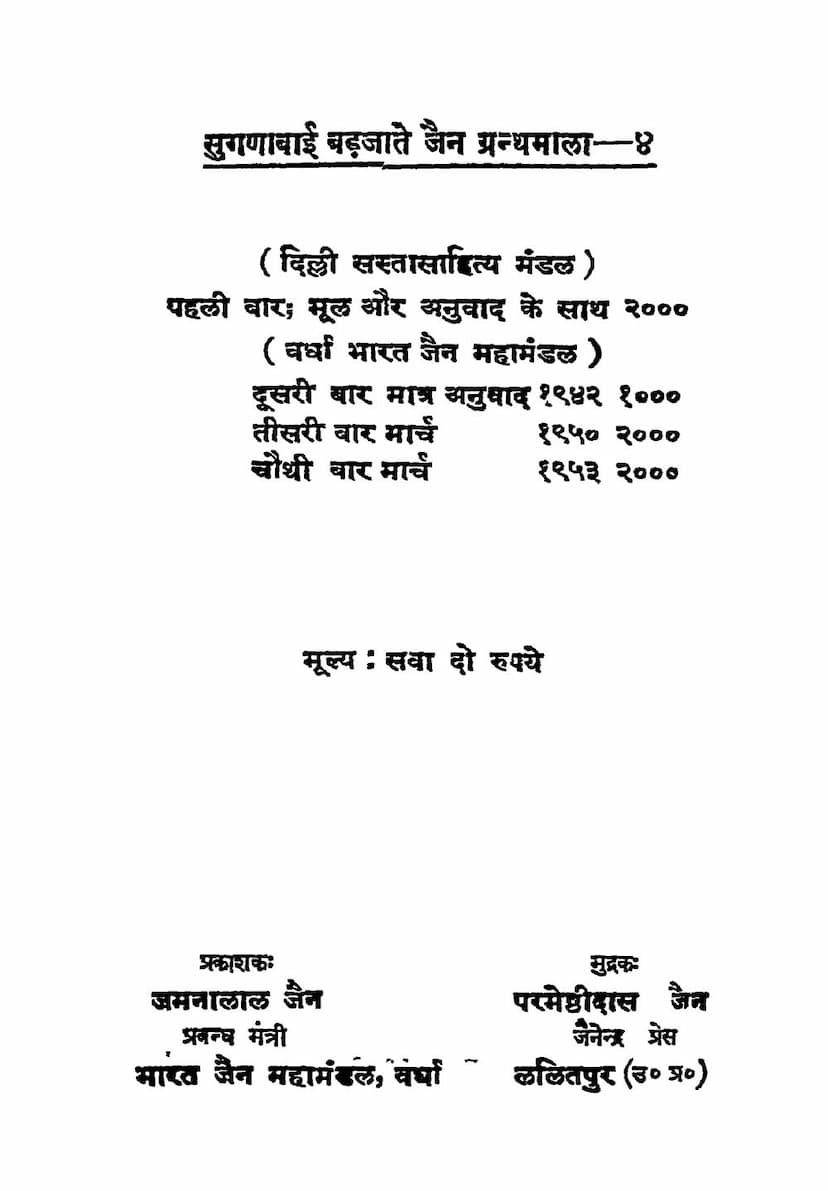Mahaveer Vani
Added to library: September 2, 2025

Summary
This Jain text, "Mahaveer Vani" by Bechardas Doshi, published by Bharat Jain Mahamandal, is a compilation of the teachings of Lord Mahavir. The book has gone through several editions, with this particular version being the fourth. It presents Mahavir's teachings in a structured manner, categorized into various "sutras" or aphorisms, each focusing on a specific ethical or philosophical principle.
The book includes:
-
Preamble and Editorials: The initial pages contain introductory remarks from the publisher and the editor, highlighting the significance of Mahavir's teachings and the purpose of this compilation.
-
Structure of Teachings: The core of the book is dedicated to presenting Mahavir's teachings, divided into 25 distinct sections or "sutras." These include:
- Mangal-Sutra: Auspicious invocations.
- Dharma-Sutra: The principles of righteousness and duty.
- Ahimsa-Sutra: The doctrine of non-violence, a cornerstone of Jainism, emphasizing compassion towards all living beings.
- Satya-Sutra: The importance of truthfulness in thought, word, and deed.
- Asteya-Sutra: The principle of non-stealing and refraining from acquiring anything that is not rightfully earned.
- Brahmacharya-Sutra: The path of chastity and celibacy, encompassing control over senses and desires.
- Aparigraha-Sutra: The concept of non-possession and detachment from material possessions.
- Anrata-Bhojan-Sutra: The practice of not eating at night, rooted in avoiding harm to unseen organisms.
- Vinay-Sutra: The virtue of humility, respect, and discipline.
- Chaturangiya-Sutra: The four essential elements for spiritual progress: human birth, the opportunity to hear the Dharma, faith, and valor in practice.
- Apramada-Sutra: The importance of vigilance and diligence in spiritual practice, avoiding negligence.
- Pramad-Sthan-Sutra: The states or actions that lead to negligence and spiritual downfall.
- Kashaya-Sutra: The control over passions like anger, pride, delusion, and greed.
- Kama-Sutra: The subjugation of desires and passions.
- Asharana-Sutra: The realization that worldly possessions, relationships, and the body are impermanent and offer no ultimate refuge.
- Chal-Sutra: The folly of ignorance and attachment to worldly pleasures.
- Pandit-Sutra: The qualities of a wise person who understands the transient nature of the world and strives for spiritual liberation.
- Atma-Sutra: The focus on the soul (Atma) as the true self and the path to self-realization.
- Loktattva-Sutra: The principles of the universe and the nature of reality.
- Pujya-Sutra: The qualities of a venerable and respectable person.
- Brahmana-Sutra: The true definition of a Brahmin based on conduct and spiritual realization, not birth.
- Bhikkhu-Sutra: The path and conduct of a mendicant or monk.
- Mokshmarg-Sutra: The path to liberation or salvation.
- Jatimada-Nivaran-Sutra: The eradication of pride based on caste, lineage, or family, emphasizing the equal spiritual potential of all souls.
- Kshamapana-Sutra: The importance of seeking and granting forgiveness for any offense.
-
Translations and Explanations: The text includes the original Prakrit verses and their Hindi translations. Some sections also feature explanations or interpretations, clarifying the meaning and context of the verses.
-
Sanskrit Translations: A significant feature of this edition is the inclusion of Sanskrit translations for the Prakrit verses, making the teachings accessible to a wider audience.
-
Corrections: A "Shuddhipatraka" (errata) is included, acknowledging and rectifying printing errors.
-
Alphabetical Index: An alphabetical index of the verses is provided at the end for easy reference.
The book emphasizes the core Jain tenets such as non-violence, truth, non-stealing, celibacy, non-possession, control of senses, humility, vigilance, and the pursuit of liberation through self-discipline and spiritual knowledge. It highlights the importance of inner purity and ethical conduct over external rituals or birth status. The inclusion of testimonials from prominent figures like Vinoba Bhave underscores the universal appeal and spiritual depth of Lord Mahavir's message.